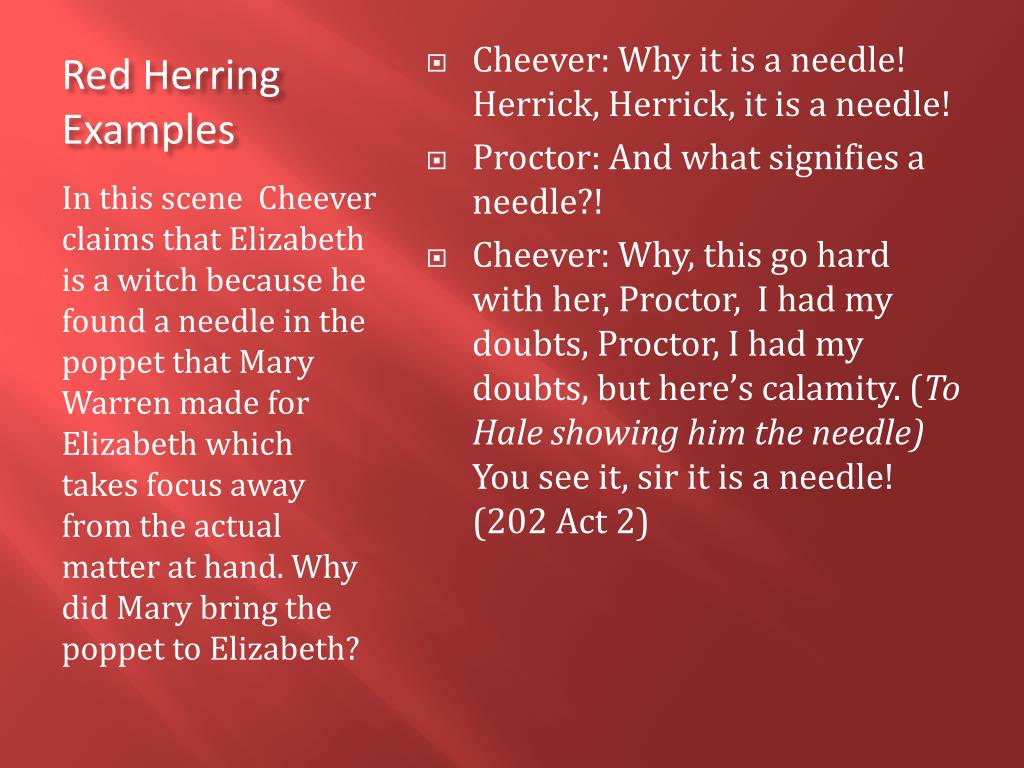

Whether a statement is true or false has nothing to do with whether it’s fallacious or not. Remember, dismantling a logical fallacy involves pointing out the flaw in how the argument is constructed, not proving it wrong. Whether this is true or not, this is the arguer’s assertion.
#Examples of the red herring fallacy how to#
The arguer begins with the premise that self-defense classes teach their participants how to fight more effectively. So we shouldn’t have a self-defense class on campus. A self-defense class teaches participants how to fight better, but fighting is wrong.This can take some dissecting, especially when you’re facing an argument that isn’t as clearly spelled out as those in the first set of examples we provided.


You can identify equivocation in writing by examining an argument closely to find the gap between the arguer’s initial claim and their final conclusion. Because there are so many ways to use equivocation, it can be one of the trickier logical fallacies to pick out in a piece of writing. A few common instances of doublespeak in English include:ĭoublespeak often involves euphemisms, but it doesn’t always. Another term you might know, doublespeak, refers to equivocation. What is the purpose of the equivocation fallacy?Įquivocation is often used as an obfuscation strategy. A pharmaceutical company states that a drug could have minor side effects when they know that the drug can actually cause heart attacks.A consultant tells you they haven’t worked for your direct competitor but fails to mention that they’ve worked for other competitors.
#Examples of the red herring fallacy driver#
A driver who gets pulled over tells the officer that they drank only a few beers when in reality they had a few beers plus two mixed drinks.Sometimes, as we discussed in our example of the student telling their teacher that they’d worked on their assignment the night before, it’s used as a strategy to lie by omission. īut equivocation isn’t always formatted this way. It can even seem comically simple, so much so that it feels ridiculous to group it with other logical fallacies you might encounter in writing. That means tigers make great pets.Įquivocation is easy to spot when it’s spelled out like this. Women aren’t men, so all women aren’t created equal. Įquivocation is an informal fallacy, which means the illogical part of the argument lies with how the argument is applied rather than the structure of the argument itself.Įquivocation is often spelled out in this format: “If X is Y, and Y is Z, then Z must be X.” Here are a few examples: Other fallacies that often arise in these kinds of discussions include the straw man fallacy and red herring fallacy. Equivocation isn’t the only logical fallacy that can be employed in a bad faith argument or an argumentative essay. Generally, individuals make bad faith arguments in attempts to avoid having to think critically about the issues they’re discussing and to avoid acknowledging that their opponents’ positions are well-reasoned and understandable. The phrase “bad faith argument” means a statement or position that the arguer knows isn’t honest or fair. It’s technically true, but while the student assumes the teacher thinks they mean “finished,” they actually meant that they merely did some work on the still-unfinished assignment. For example, when asked about an overdue assignment, a student might tell their teacher that they worked on the assignment the night before. In other cases, it’s employed as a way to make a bad faith argument. Sometimes, equivocation is used for a humorous effect. Obviously, taco salad isn’t a dish most people would consider healthy. Salad is healthy, and taco salad is a salad.Grammarly helps you communicate confidently Write with Grammarly What is the equivocation logical fallacy?Įquivocation, aka “calling two different things by the same name,” is the logical fallacy of using a word or phrase in an argument either:


 0 kommentar(er)
0 kommentar(er)
